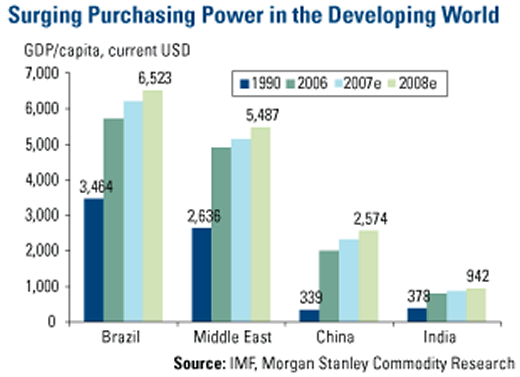Don't Blame Crude OIl Speculation- Commodity Prices Are Driven by Fundamentals
Commodities / Crude Oil May 27, 2008 - 10:55 AM GMTBy: Frank_Holmes
 John Derrick writes: U.S. Global Investors (Nasdaq: GROW ) recently hosted a webcast titled “Energy and Commodities Trends: Speculative or Sustainable?” to provide a closer look at the current strength in natural resources prices. Our timing for this topic was good: oil prices hit a record $135 a barrel last week and drivers get more and more depressed every time they pull up to the gas pump.
John Derrick writes: U.S. Global Investors (Nasdaq: GROW ) recently hosted a webcast titled “Energy and Commodities Trends: Speculative or Sustainable?” to provide a closer look at the current strength in natural resources prices. Our timing for this topic was good: oil prices hit a record $135 a barrel last week and drivers get more and more depressed every time they pull up to the gas pump.
Americans want to know how long we are going to have to put up with this. The answer to that question depends on whether one places most of the blame for today's prices on market speculators or on a fundamental shift in global supply and demand trends.
When we answer that question, we think it's important to offer both short-term and long-term viewpoints.
The flood of new money into energy and commodities from pension funds, hedge funds and other large investors has created some frothiness in those markets. We said recently that a short-term correction in the price of oil was likely, based on our statistical models.
But we think the long-term price trend will continue upward due to global growth.
The world is growing more populous and more prosperous. Rising living standards in the developing world are increasing demand for resources, which is driving up commodity prices across the board because supply can't keep pace.
People around the world are consuming more calories (greater demand for food), they are buying more cars (greater demand for steel and oil), they are building bigger homes (greater demand for cement and copper), and so on.
And there are also interrelationships between these trends—for example, vast amounts of farmland in the developing world are being transformed into housing tracts, which reduces the acreage for food production. This pinches supply at the same time that demand is soaring.

The chart above clearly illustrates this prosperity trend. In China , per-capita GDP has risen from $339 in 1990 to $2,574 this year—that's nearly an eightfold increase in less than two decades. In India and the Middle East , the numbers have more than doubled, and Brazil is close to doubling. Rising incomes lead to greater consumption of energy and commodities, which exerts pressure on prices.
Along with growing populations and growing prosperity, there is also growing urbanization. In China we're expecting roughly 500 million people to move to cities or towns over the next three decades. India 's urban population is expected to reach 540 million by 2025, roughly double today's level.
This trend has been at work for years. About three billion people—nearly half of the world—live in urban areas right now. To give you an idea of the scale, that's more people than the total global population in the mid-1960s. To keep up with the increase, cities are expanding their water systems, electricity grids, roadways and other infrastructure. Estimates are that $40 trillion will be needed over roughly the next 20 to 25 years to build out this infrastructure, which will exert price pressure on commodities.
Another way of weighing speculation against fundamentals is to look at metals prices.
Many metals are hard to speculate on because they are not listed on commodities exchanges—these include iron ore, steel, magnesium and cobalt. Research from Lehman Brothers found that a group of key non-exchange-traded metals shot up 600 percent between early 2002 and early 2008. During the same time, prices of listed base metals—copper, aluminum, nickel, zinc and lead—rose only 250 percent. This tells us that fundamental demand is the dominant factor in driving metals prices higher.
People want to blame speculation because that would give them hope that today's food and energy prices will return to “normal” after the bubble bursts.
This is the way it has worked in the past, but most people don't understand or perhaps don't want to accept the fact that we have reached a tipping point across the board in commodities that will support even higher prices in the future.
For more insights and perspectives from U.S. Global Investors, visit CEO Frank Holmes' investment blog “Frank Talk” at www.usfunds.com/franktalk .
By John Derrick
Director of Research
U.S. Global Investors Inc.
All opinions expressed and data provided are subject to change without notice. Some of these opinions may not be appropriate to every investor. The S&P 500 Stock Index is a widely recognized capitalization-weighted index of 500 common stock prices in U.S. companies. The Goldman Sachs Commodity Index is a composite index of commodity sector returns, representing an unleveraged, long-only investment in commodity futures that is broadly diversified across the spectrum of commodities. Merrill Lynch U.S. Government Index tracks the performance of U.S.-dollar-denominated Treasury and Agency bonds issued in the domestic bond market. The MSCI EAFE ( Europe , Australia and Far East ) Index measures the performance of the leading stocks in 21 developed countries outside North America . There were no clients of U.S. Global Investors which held any of the securities mentioned in this article as of December 31, 2007.
Frank Holmes Archive |
© 2005-2022 http://www.MarketOracle.co.uk - The Market Oracle is a FREE Daily Financial Markets Analysis & Forecasting online publication.


